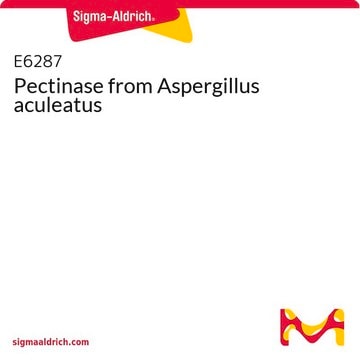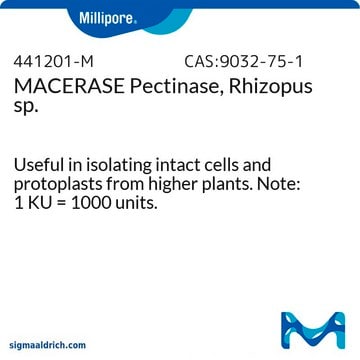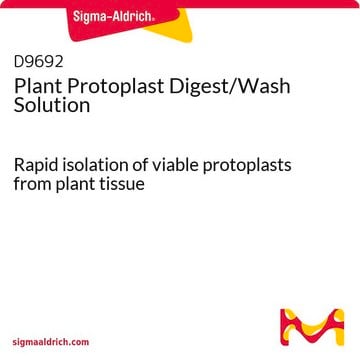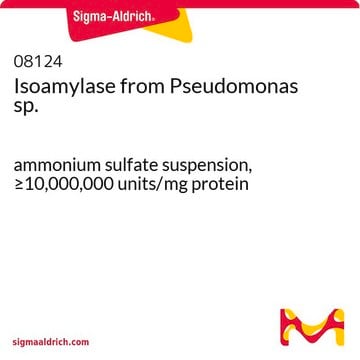17389
Pectinase from Aspergillus niger
powder, slightly beige, >1 U/mg
Synonym(s):
Polygalacturonase
Sign Into View Organizational & Contract Pricing
All Photos(1)
About This Item
Recommended Products
biological source
Aspergillus niger
Quality Level
form
powder
specific activity
>1 U/mg
color
slightly beige
storage temp.
2-8°C
Looking for similar products? Visit Product Comparison Guide
General description
Pectinase, also known as pectinolytic enzyme, is predominantly found in bacteria, fungi and plants. polygalacturonase is a highly found enzyme among all the pectinolytic enzymes.
Application
Pectinase from Aspergillus niger has been used to hydrolyze pectin layers in
- activated sludge flocs
- bamboo powder for degumming process
- garden cress (Lepidium sativum) seeds to enhance testa permeability, visualized using tetrazolium staining solution
Biochem/physiol Actions
Pectinase found in plants aids in cell wall extension and softening of some plant tissues during maturation and storage. Polygalacturonase is the enzyme that catalyzes the hydrolysis of the polygalacturonic acid chain by addition of water. Pectinase has wide range of industrial applications including, fruit juice extraction and its clarification, scouring of cotton, degumming of plant fibers and waste water treatment. In addition, it is also used in vegetable oil extraction, tea and coffee fermentations, bleaching of paper, in poultry feed additives and in alcoholic beverages and food industries.
Unit Definition
1 U corresponds to the amount of enzyme which liberates 1 μmol galacturonic acid from polygalacturonic acid per minute at pH 4.0 and 50 °C.
Signal Word
Danger
Hazard Statements
Precautionary Statements
Hazard Classifications
Resp. Sens. 1
Storage Class Code
11 - Combustible Solids
WGK
WGK 3
Flash Point(F)
Not applicable
Flash Point(C)
Not applicable
Personal Protective Equipment
dust mask type N95 (US), Eyeshields, Gloves
Choose from one of the most recent versions:
Already Own This Product?
Find documentation for the products that you have recently purchased in the Document Library.
Customers Also Viewed
Microbial pectinolytic enzymes: a review
Jayani RS, et al.
Process Biochemistry (Oxford, United Kingdom), 40(9), 2931-2944 (2005)
Aránzazu Manzano et al.
American journal of botany, 108(9), 1775-1792 (2021-09-16)
Light and gravity are fundamental cues for plant development. Our understanding of the effects of light stimuli on plants in space, without gravity, is key to providing conditions for plants to acclimate to the environment. Here we tested the hypothesis
Bamboo fibre processing: insights into hemicellulase and cellulase substrate accessibility
Fu Jiajia, et al.
Biocatalysis and Biotransformation, 30(1), 27-37 (2012)
Mukul Joshi et al.
Frontiers in plant science, 12, 725479-725479 (2021-09-08)
Pomegranate (Punica granatum L.) fruit is well known for its health-beneficial metabolites. The pomegranate peel consists of an inner thick spongy white tissue, and an outer smooth skin layer that accumulates anthocyanins in red cultivars when ripe. The skin is
Eman Ibrahim et al.
Journal of biochemistry, 169(1), 109-117 (2020-08-19)
Lignocellulosic biomass conversion using cellulases/polygalacturonases is a process that can be progressively influenced by several determinants involved in cellulose microfibril degradation. This article focuses on the kinetics and thermodynamics of thermal inactivation of recombinant Escherichia coli cellulases, cel12B, cel8C and
Our team of scientists has experience in all areas of research including Life Science, Material Science, Chemical Synthesis, Chromatography, Analytical and many others.
Contact Technical Service











